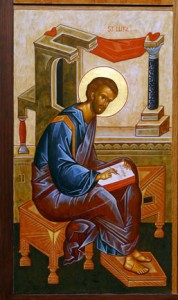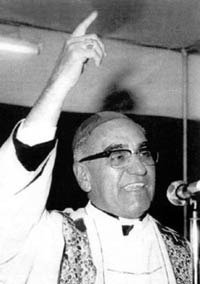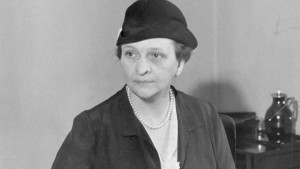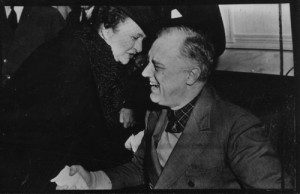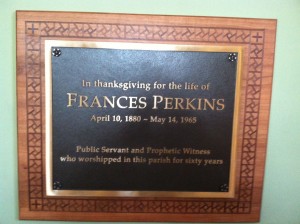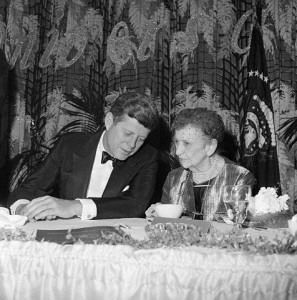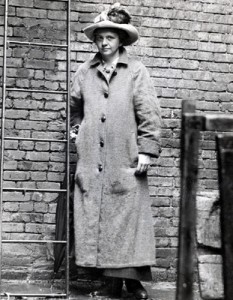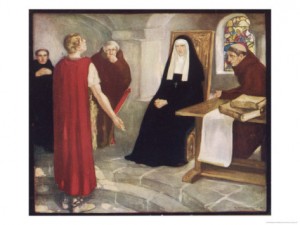The Faithful Four continues today as Luke the Evangelist and Oscar Romero vie for a shot at Frances Perkins and the coveted Golden Halo. To get to this point, Oscar sailed past Elizabeth Ann Seton, Lucy, and Florence Li Tim-Oi while Luke defeated Absalom Jones, John Donne, and Dorothy Day.
In yesterday's contest, after Hilda of Whitby jumped out to a slim early lead, Frances Perkins stormed past her like Spectacular Bid on the inside rail and cruised to a 61% to 39% victory with nearly 5,600 votes cast.
Voting for the Golden Halo will commence at 8:00 am Eastern Time on Spy Wednesday and the winner will be announced at 8:00 am on Maundy Thursday. Scott and Tim share this information and discuss the process for nominating saints for Lent Madness 2014 in their most recent Monday Madness video. And speaking of videos, don't forget to watch the archbishop's commentary about today's match-up from Maple Anglican -- AND they answer the question that many have been asking "Why is Wednesday in Holy Week called Spy Wednesday?"
It is true that no one actually knows the name of the author of Luke-Acts. However, whoever it is took “Luke” as a pen name, writing in first person about adventures in the early church in the guise of a Gentile, a physician, and a faithful companion. Whoever “Luke” was, the author has shared the good news of God in Christ in ways that form me on a daily basis.
Because of Luke, we hear the angel messengers proclaim “Do not be afraid” to Mary and the shepherds in the fields. Because of Luke, we hear Mary sing the Magnificat and with Simeon see the Savior whom God has prepared for all the world to see.
Because of Luke, we hear Jesus proclaim “Blessed are you who are poor” and know the story of the poor man Lazarus brought to rest with his father Abraham. Because of Luke, we see Jesus call the wealthy and despised tax collector Zacchaeus by name and hear him proclaim, “Salvation has come to this house.”
Because of Luke, we hear the story of the Samaritan who teaches us to be a neighbor to all. Because of Luke, we hear the story of the 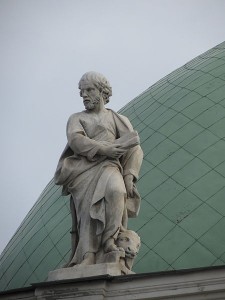 wastrel son welcomed home by his extravagant father.
wastrel son welcomed home by his extravagant father.
Because of Luke, we meet Jesus on the road to Emmaus after the resurrection and see him revealed in the breaking of the bread. Because of Luke, we see the Holy Spirit arrive on the day of Pentecost.
Because of Luke, we see how 100 men and women can turn the known world upside-down. Because of Luke, we learn along with Peter that God has called no one unclean.
Through Luke, we meet John’s mother Elizabeth, Anna the prophet, Stephen the deacon, Cornelius the Roman Centurion, an unnamed Eunuch from Ethiopia, Lydia the businesswoman and homeowner. Through Luke we meet Saul the persecutor and Paul the missionary.
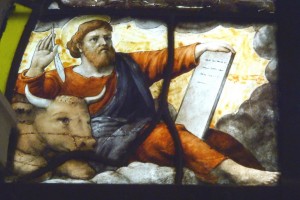 There is no doubt that the stories of Luke are an indelible part of my understanding of Jesus’ life and ministry and of the work of the Church.
There is no doubt that the stories of Luke are an indelible part of my understanding of Jesus’ life and ministry and of the work of the Church.
But for me there’s something intangible, too, about Luke’s message. Shot through Luke’s works is a deep understanding of all being welcome, all being known, all being forgiven, all being loved. And it is due to Luke that I discovered that I too am called to convey this message of welcome and love and belonging to the world.
I simply cannot imagine my faith without the words and witness of Luke.
Palm Sunday 2013 marked the 33rd year since the assassination of Archbishop Romero. It has been thirty-three years since he was killed, saying mass for the few nuns and cancer patients in the hospice where he chose to live, even as the highest Church official in El Salvador.
For me, the hardest aspect of Romero's story is that there is no clear-cut happy ending; there is no moment you can point to when "it gets better." He lasted only three years as archbishop, then he was killed by the death squads who roamed his country. The government would not even let him be buried in peace: the funeral was the scene of a riot. From a purely rational standpoint, he failed.
And yet...his ministry reflected the love of God Incarnate in a way that few others have. Romero so believed in a God made human that it was impossible for him to view his fellow humans with anything less than the devotion he reserved for God. God became human in Jesus, and now all humanity was no less holy, no less worthy than Christ --and not far off, in a distant heaven, but here and now.
That sounds like a pretty treatise, but for Romero, nothing was more urgent, or relevant, than the Incarnation. It was life and 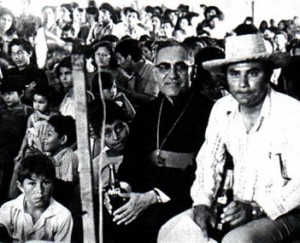 death. When he preached, he gave voice and affirmation to thousands who felt themselves punished and abandoned by God and the Church. When he said that God saw the suffering of the poor, and wanted it to end, he embodied God's love for them in a tangible way. When he read out the names of the desaparecidos on the radio, and handed them to the pope, it was a sign that God, too, remembered. When he called out the death squads, and asked them to repent, Romero made the gospel real for a struggling people that needed it.
death. When he preached, he gave voice and affirmation to thousands who felt themselves punished and abandoned by God and the Church. When he said that God saw the suffering of the poor, and wanted it to end, he embodied God's love for them in a tangible way. When he read out the names of the desaparecidos on the radio, and handed them to the pope, it was a sign that God, too, remembered. When he called out the death squads, and asked them to repent, Romero made the gospel real for a struggling people that needed it.
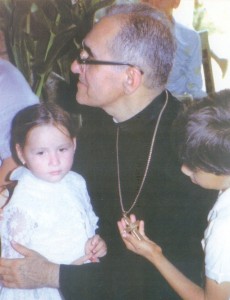 Romero always said he was unafraid of death, because he "believed in resurrection; he would rise again in the Salvadoran people." And indeed, after his death, it was the people who kept his memory alive. It was the people of El Salvador who turned out en masse for his funeral. It was the people who turned his grave into a shrine, declared him presente at rallies, remembered his words, and kept on struggling for justice, because they believed in the gospel Romero preached. They believed in the God Romero knew. And they had begun to see themselves as Romero did -- as inherently dignified, remembered, and loved by God.
Romero always said he was unafraid of death, because he "believed in resurrection; he would rise again in the Salvadoran people." And indeed, after his death, it was the people who kept his memory alive. It was the people of El Salvador who turned out en masse for his funeral. It was the people who turned his grave into a shrine, declared him presente at rallies, remembered his words, and kept on struggling for justice, because they believed in the gospel Romero preached. They believed in the God Romero knew. And they had begun to see themselves as Romero did -- as inherently dignified, remembered, and loved by God.
Romero lives on, by virtue of the country he loved, the people he continues to inspire, and through the gospel he died to live.
Romero presente.
Vote!
[poll id="75"]

